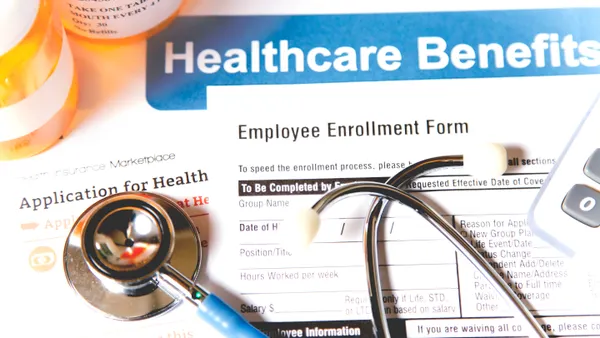Dive Brief:
-
Family premiums for employer-sponsored health plans rose 5% this year to an average of $19,616, according to findings from the 2018 benchmark Kaiser Family Foundation Employer Health Benefits Survey. Single coverage increased 3% to $6,896. On average, employees contribute $5,547 and $1,186, respectively. The report also found that 85% of covered workers now have deductibles, which are raising health expenses.
-
Increases in premiums track with the 2.6% rise in workers' wages and 2.5% rise in inflation, the KFF study showed. However, health costs are outpacing the growth of wages and inflation over time; since 2008, average premiums for family coverage have increased 55%, or twice as fast as employees' earnings and three times faster than inflation.
- In other survey highlights, the report shows that 29% of employers that provide health benefits offer high-deductible health plans with savings options; 74% of companies with at least 200 workers offer telemedicine; and 76% of large companies provide retail clinical services, located in supermarkets, pharmacies and other retail establishments.
Dive Insight:
Healthcare costs continue to rise, keeping the pressure on employers to find ways to curb expenses and reduce costs without passing those costs onto employees via higher premiums and deductibles. Big companies, in particular, are getting more involved in the cost and delivery of health services through such entities as performance networks, centers of excellence and accountable care organizations, the National Business Group on Health found in a study this year. Some larger names are even bypassing insurers to negotiate prices directly with providers. For example, Amazon, Berkshire Hathaway and JPMorgan Chase have joined forces to try to more directly influence healthcare for their workers.
Employers are also trying to curb costs through employee wellbeing initiatives, Willis Towers Watson recently reported, which can include preventive measures that address stress-inducing health conditions, such as chronic illnesses, financial problems and behavioral disorders.
Others are making use of technological tools to slow the rise in healthcare costs. Employees say they want 24/7 access to health information, and employers are responding with access to telemedicine, health-monitoring apps and other tech-driven mechanisms. The payoff can be better-engaged employees and improved productivity, as well as lower healthcare costs thanks to better utilization of employers' offerings.











